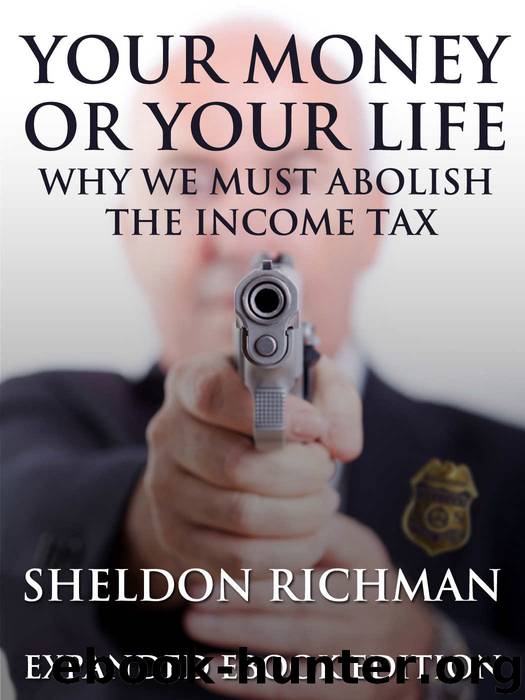Your Money or Your Life by Sheldon Richman

Author:Sheldon Richman
Language: eng
Format: azw3, epub
ISBN: 9781890687113
Publisher: The Future of Freedom Foundation
Published: 2013-03-17T04:00:00+00:00
Manipulation via the Tax Code
The people who write tax legislation are aware of the disincentives involved in progressive taxation, and they have tried to mitigate those effects without giving up progressivity altogether. That has resulted in the crazy-quilt system of tax deductions and credits that so many people complain about. It should be pointed out that most of these preferences benefit those who are better off. First, they more often apply to the activities of the better-off. Second, expensive tax advice, which most middle-class and working-class people can’t afford, may be needed to take advantage of them. Finally, deductions are worth more in the higher tax brackets.
Given the objections to progressivity, the lowering of the real tax rate through deductions and credits may seem like a blessing. But they bring their own problems. The methods used to offset the system’s disincentives influence people’s behavior, undermine the efficacy of the marketplace, and increase the burden of the tax process. That is because the preferences target particular activities chosen arbitrarily through the political system.
To the extent that economic activity is directed by the tax-bill writers and the people who influence them, the market process is less capable of serving the public than it would otherwise be. If a deduction is allowed for activity X but not activity Y, people will tend to pursue activity X. The people who write the tax code may think activity X is more worthy than activity Y, but that could be an arbitrary decision. And even if it is not strictly arbitrary, their decision is presumptuous, for it interferes with the free decision-making of market participants. Besides, if X were really more worthwhile, it would be chosen without government encouragement. In a free market, consumers determine what investment activities are undertaken in the market because serving consumers is how entrepreneurs earn profits. When the tax code distracts entrepreneurs from that task, society is worse off. The code’s jungle of technical rules regarding deductions, allowances, depreciation schedules, and the rest (all of which would be abolished along with the income tax) is a massive intrusion into the entrepreneurial process. Instead of concentrating on how best to increase people’s living standards, businessmen must be concerned with minimizing the taxes they have to pay. Taxes reduce the returns to investment, of course, and thus make some worthy projects uneconomical. Moreover, to minimize taxes, entrepreneurs may have to do wasteful things that reduce prosperity. That is most obvious with tax shelters, in which people can cut their taxes by engaging in explicitly unproductive activities. Although tax-law changes have made most tax shelters passé, that aspect of the code is not gone entirely. For example, since the interest on municipal bonds is tax-free, money that would have gone toward satisfying consumer preferences instead is dedicated to local projects.
We should not underestimate how manipulative the government can be through the tax code. Depending on how it treats real-estate investments, the government can, and has, set off booms and busts, creating and then wiping out fortunes.
Download
This site does not store any files on its server. We only index and link to content provided by other sites. Please contact the content providers to delete copyright contents if any and email us, we'll remove relevant links or contents immediately.
The Secret History by Donna Tartt(19088)
The Social Justice Warrior Handbook by Lisa De Pasquale(12190)
Thirteen Reasons Why by Jay Asher(8909)
This Is How You Lose Her by Junot Diaz(6886)
Weapons of Math Destruction by Cathy O'Neil(6279)
Zero to One by Peter Thiel(5801)
Beartown by Fredrik Backman(5754)
The Myth of the Strong Leader by Archie Brown(5507)
The Fire Next Time by James Baldwin(5444)
How Democracies Die by Steven Levitsky & Daniel Ziblatt(5218)
Promise Me, Dad by Joe Biden(5153)
Stone's Rules by Roger Stone(5087)
A Higher Loyalty: Truth, Lies, and Leadership by James Comey(4962)
100 Deadly Skills by Clint Emerson(4925)
Rise and Kill First by Ronen Bergman(4788)
Secrecy World by Jake Bernstein(4753)
The David Icke Guide to the Global Conspiracy (and how to end it) by David Icke(4717)
The Farm by Tom Rob Smith(4507)
The Doomsday Machine by Daniel Ellsberg(4490)
